John Janaro's Blog, page 254
June 13, 2015
The Heart of a Mother
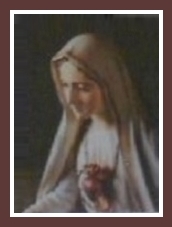 "I treasure Your word in my heart.I will ponder all Your precepts,
"I treasure Your word in my heart.I will ponder all Your precepts,and fix my eyes on Your ways"(Psalm 119:11,15).
At the center of the mystery of the universe and of life, there is the heart of a Mother who loves each one of us.
Through her never-failing intercession, let us pray especially for women to say "yes" from the heart to the vocation that God gives each of them to cooperate with His grace, and to be instruments of His love, compassion and mercy in the world.
We place our trust in the All-Holy, Immaculate Heart of Mary, Mother of God and Mother to each of us and to every human being. Merciful Mother, keep us in your heart and bring us to Jesus.
Published on June 13, 2015 10:30
June 12, 2015
Heart of Jesus, Heart of Love
 Blessed be Jesus in His Most Sacred Heart!
Blessed be Jesus in His Most Sacred Heart!The all-holy, all-merciful God loves each and every one of us, all the way to the depths of our being, with His own human heart, the Heart of Jesus.
May we know this Love today, as we celebrate this great feast, and give Him all our love and all our trust.
Published on June 12, 2015 20:59
June 10, 2015
Is it Really Possible to "Be Happy"?
 There's more to "happy" than just a "smiley face"What does it mean to "be happy"? Is it possible to be really " happy" in this life?
There's more to "happy" than just a "smiley face"What does it mean to "be happy"? Is it possible to be really " happy" in this life?Well...yes and no.
We can attain goals in life, and draw a measure of satisfaction from them. But life doesn't stop. When I achieve what I want, I find new possibilities opening up.
The question emerges, "what shall I do next?"
It can be a joyful experience, this journey. In fact, it is meant to be. But it keeps moving. It's an adventure, and as long as you are still breathing, you know in your heart that it's not over.
Look at the way you act. Why do you do things? Because you want something. There is a sense of anticipation, a sense that reality has something to offer. So you choose, you act, and you possess things, enter into relationships, live life. And that sense of anticipation is verified. You have a taste of genuine goodness.
But the sense of the possibility of fulfillment only deepens. The desire to live intensifies. To move forward. Because you want something infinite.
The heart has no boundaries. Yet here we are, in this moment, in the midst of things that are limited. If we try to grasp things and stretch them so that they correspond to the scope of our hearts, we will distort them and ultimately tear them apart.
This is the source of violence.
But if we act with the recognition that there is something more, that the goodness of things points to something and promises something that we do not see and cannot attain by our own power, then we act with receptivity, with a need and a question that opens us up to something or Someone who corresponds to our boundless hearts.
This is the seed of prayer.
Published on June 10, 2015 22:49
June 9, 2015
The Robin Family "Leaves the Nest"
Time for a "Robin Family" update. Gosh, they grow up fast! Some amazing pictures from the beginning of June:
 These three quickly learned how to make noise, and to eat a lot!
These three quickly learned how to make noise, and to eat a lot!
 They started opening their eyes...
They started opening their eyes...
 And within a week they are out of the nest, though still carefully watched over by Mama bird. They flitter into tall grass...
And within a week they are out of the nest, though still carefully watched over by Mama bird. They flitter into tall grass...
 Then, off "on their own," perched on their own branches. So soon!
Then, off "on their own," perched on their own branches. So soon!
 These three quickly learned how to make noise, and to eat a lot!
These three quickly learned how to make noise, and to eat a lot! They started opening their eyes...
They started opening their eyes... And within a week they are out of the nest, though still carefully watched over by Mama bird. They flitter into tall grass...
And within a week they are out of the nest, though still carefully watched over by Mama bird. They flitter into tall grass... Then, off "on their own," perched on their own branches. So soon!
Then, off "on their own," perched on their own branches. So soon!
Published on June 09, 2015 20:17
June 8, 2015
Why I Am a Catholic Christian
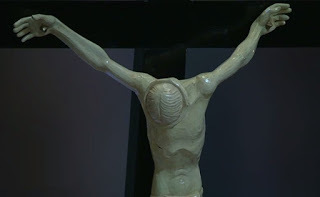 The Catholic bloggers are all writing about this, so I decided to join in. I have woven together and revised some previously written texts and added a few things. I thought it might be worthwhile to present a few points that strike me and sustain me.
The Catholic bloggers are all writing about this, so I decided to join in. I have woven together and revised some previously written texts and added a few things. I thought it might be worthwhile to present a few points that strike me and sustain me.These are just some considerations that in no way exhaust the mysterious fact that Jesus has made me a member of His Church by baptism, and has sustained me in faith by His grace.
He made me His own before I understood anything. But I can also say that I have really encountered Him living in the Church—in her teaching, sacraments, governance, and guidance, as well as in the communion of life with many brothers and sisters that endures in the midst of so many obstacles.
I am a Catholic Christian because Jesus is concretely present in the Church through time and space. His humanity reaches me here, in the Catholic Church. God became man 2000 years ago because He wanted me to encounter Him. He wanted (and still wants) to reach me, and you, and every person.
"What was from the beginning, what we have heard, what we have seen with our eyes, what we looked upon and touched with our hands concerns the Word of life—for the life was made visible; we have seen it and testify to it and proclaim to you the eternal life that was with the Father and was made visible to us. What we have seen and heard we proclaim now to you, so that you too may have fellowship with us; for our fellowship is with the Father and with his Son, Jesus Christ" (1 John 1:1-3).
God became man so that He could be seen, heard, and touched. God became man to be our shepherd, our servant, and to wash our feet—to accompany us in our own history all the way to its ultimate fulfillment.
God became man so that He could teach with a human voice, so that He could stretch forth a human hand over a person and say "your sins are forgiven," and—in the ultimate humiliation to which He was impelled in His gratuitous love—so that He could break His human body on the Cross and distribute it as "food and drink" to the whole human race, so that His death-defeating, immortal, risen human flesh could generate the resurrection of the flesh of all those who eat His body and drink His blood.
God became man so that He could be seen, heard, and touched.... He communicates His infinite, ineffable, transcendent Mystery through His humanity, and through visible, audible, tangible actions that are human.
The Son of the Father became man without ceasing to be God. Thus my eyes and ears don't "grasp" the Mystery of God in a reductive and limited way when they interact with this humanity of Jesus. Rather, He takes the initiative by showing Himself, by speaking, and by healing with His touch. Through His human presence and action, God awakens and nourishes my faith; He shapes the path by which my heart and soul come to know (by faith, hope, and charity) who God is, and to know His Mystery as a mystery of Love.
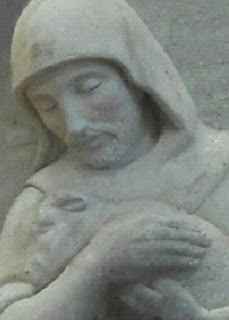 Jesus's living humanity was the method by which God willed to communicate His grace and revelation to human persons. Therefore, this same method must characterize the way that God saves me today! This is the method that follows as a consequence of the Incarnation, and it is the method that is most adapted to the condition of human beings who walk through the world of space and time.
Jesus's living humanity was the method by which God willed to communicate His grace and revelation to human persons. Therefore, this same method must characterize the way that God saves me today! This is the method that follows as a consequence of the Incarnation, and it is the method that is most adapted to the condition of human beings who walk through the world of space and time.Why did Jesus rise from the dead? Was it to become less present, less active, less effective in His saving mission? Why did Jesus ascend to the Father? Was it so that the revelation He brought might cease to present itself to our senses, might remove itself from human history, becoming once again intangible, unapproachable, distant? Was it because He didn't want to meet people one-on-one anymore, didn't want to call them personally, accompany them personally in their lives, forgive their sins personally?
On the contrary. In the Resurrection and Ascension, Jesus's humanity is transfigured and perfected; it does not cease to exist or cease to be significant. His humanity becomes greater, and the human energy of His mission becomes more extensive—after the resurrection Jesus becomes more capable (not less capable!) of being present on the roads of the world. Jesus's humanity has reached its perfection, and that means a perfection of His humanity's capacity to mediate salvation to every human person, to be humanly present in the concrete life of every person.
Therefore, today, in 2015, I should be able to find a community of the followers of Jesus who still have access to His humanity in all of the human facets that He displayed during His earthly mission. The "place" in the world today where I can follow Jesus must be a place in which His mission continues to be carried out visibly, audibly, tangibly in all of the aspects that are proper to it. There must be a human reality in the world that continues the human presence of Jesus. "I am with you all days, even unto the consummation of the world."
If I were in Judea and Galilee in 30-33 a.d. I would have been able to interact immediately with Jesus.
I could have listened to His teaching with the certitude that it was God's teaching, and the certitude that it had not been corrupted since it was coming directly from the mouth of the One who reveals and articulates Divine truth in a definitive way. I could have listened with confidence that this one human voice was to be followed over all the other conflicting voices including the confused voice of my own narrow subjectivity.
I could have obeyed the will of this man, done the things He told me to do, practiced His demands in my life, confident that His will was the expression of the will of God for my life. I could have gone up to this man and told Him all my sins, and when He said "your sins are forgiven" I would have known that God had forgiven my sins in that very moment and through the very action of Jesus enunciating these words with His human voice.
I could have stood at the foot of the Cross in the very moment when He was dying for my sins; I could have touched His risen flesh with my hands, and sat with Him at table when He broke bread and said, "take this and eat, this is my body."
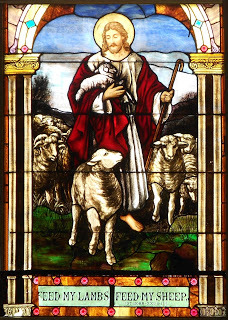 These are the human gestures and human actions through which Jesus saved people. Therefore, even today, I want to be in touch with these saving human gestures and human actions of the God-man.
These are the human gestures and human actions through which Jesus saved people. Therefore, even today, I want to be in touch with these saving human gestures and human actions of the God-man.Jesus says, "I am the Way, the Truth, and the Life." Jesus is saying here, "through me you learn what the truth about God is; I show you how you must live your life; and my action is what makes it possible for you to have that 'new humanity,' that transcendent participation in the life of God for which you were created."
Thus the place where I can follow Jesus today must be the place where His teaching continues with a single voice, His instruction continues through a single authority, and His sanctifying work continues through human gestures that communicate Divine life. Unless all of these aspects are available to me now, how can the humanity of Christ be my salvation?
Is it enough to have a book that tells me about what He did 2000 years ago, with some merely interior assurance that it applies to me now?
It is enough for me to have a book—even a book that I believe to be Divinely inspired—is it enough for me to have a book about a man who did things 2000 years ago, things the human images of which I have to reconstruct with my own imagination? Is it enough to have maybe a group of people with whom I can talk about Jesus and try to stimulate my memory and emotions with words spoken about His absent humanity?
Is it enough to have God as a "spiritual presence within," as though after the Incarnation, Death, and Resurrection of Jesus, God suddenly decided to abandon the method of using human realities as His instruments, and instead to give direct, interior, spiritual subjective revelations?—revelations, moreover, about which everyone disagrees and which each interprets in his own way, so that the clear human voice of Jesus can no longer be distinguished in the cacophony of conflicting testimonies to inner experiences?
Or is there a hypothesis which is much simpler, more consistent, more adequate, more in keeping with the kind of man Jesus was and the character and intent of His mission?
The very nature of Jesus's presence in the world as God Incarnate suggests that the fundamental characteristics of this presence must continue if Jesus's saving work is to continue. This means that, in some humanly real way, the same possibilities for interacting with Jesus must exist today that existed in 30 a.d. Indeed the possibility of "encountering" Jesus must be greater now, not less! "Greater works than these you shall perform, because I go to the Father."
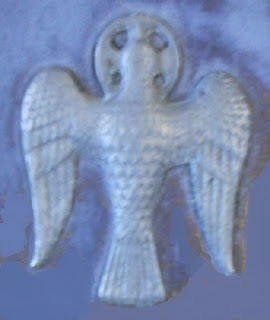 Jesus rose from the dead and sent the Holy Spirit. Some non-Catholic Christians, however, may not grasp the full significance of this. They seem to think that the Holy Spirit replaces the humanity of Jesus; that the work of Christ's humanity is over and done, and that everything is now left to the interior, illuminating presence of the Spirit testifying in the heart of the person.
Jesus rose from the dead and sent the Holy Spirit. Some non-Catholic Christians, however, may not grasp the full significance of this. They seem to think that the Holy Spirit replaces the humanity of Jesus; that the work of Christ's humanity is over and done, and that everything is now left to the interior, illuminating presence of the Spirit testifying in the heart of the person.But in the Catholic understanding Jesus sends the Holy Spirit in order to deepen and amplify the mediation of His humanity, not to lessen it. The Holy Spirit effects the interiorization and the vitality of what Jesus gives me through His sacred humanity, but my personal encounter with Jesus retains its human concreteness—Jesus remains humanly objective, "in front of" me and not simply "within" me (although He is also within me).
Jesus became incarnate so that human beings would not be alone in their own subjectivity—so that we would not be alone with our speculations, so that there would be a humanly perceivable reality in front of us to which we could submit ourselves, upon which we could depend.
Jesus became incarnate so as to mediate the way, the truth, and the life to us from a "position" that is outside of our own subjectivity, a "reference point" that is objective for every human person, "present" for every human person. "No one has ever seen God; it is the Only Son, ever at the Father's side, who has revealed Him" (John 1:18).
There is some reason for making the following point about the "modern epoch," with all due respect to non-Catholic Christians who are sincerely opposed to the autonomous individualism of our culture today. It must be said that the Protestant tendency to locate the reference point of Christianity in the inner illumination of the Spirit rather than in an objective human presence (a presence to which the Spirit bears witness) has led us inexorably into the trap of subjectivism: Ultimately, there is no objective authority that can ever tell me that my inner experience or personal interpretation is wrong, and there is no objective contact with the human concreteness of the Mediator who saves me.
But I want (and I need) this contact! I am not pure spirit. I am not pure consciousness. I am a man of spirit and body, and God became man so as to address me wholly, spirit and body.
It's true that Jesus says, "The flesh profits nothing"—but the "flesh" (sarx) is not my bodily reality as a human person. The "flesh" is materiality and temporality emphasized exclusively and in itself; it is the "stuff" of my humanity insofar as it is "cut off" from (or resistant to) the Spirit of God, and therefore also not integrated into my personal reality as a human being.
Christ's words "are spirit and life," but that means that they are spiritual in a way that informs life, human life; they are spiritual in a way that communicates life also to the body, that saves the body from degenerating into dead flesh and restores it to its integral place within the human person. Human spirituality that rejects the goodness of the body is as bad (or even worse) as human carnality unruled by the spirit. The human being needs the integration of both; which is why he needs the mediation of the Incarnate Word.
This understanding of the Incarnation has implications for our question about "how to follow Jesus today."
In the world of 2015, I must look for a human voice that teaches the truth of Jesus with consistency, with unity—a voice that I can count on, that won't lead me astray.
I must look for a human authority to which I can entrust myself, which I can follow with confidence because the demands of this authority communicate to me clearly the will of Christ which is for the ultimate good of my person.
I must look for those human gestures through which Jesus Himself calls me to be His disciple, strengthens me and sends me off to bear witness to Him, looks upon me compassionately and forgives my sins.
I must find a way to "stand at the foot of the Cross"—to be touched directly, physically by that once-and-for-all sacrificial act that happened so long ago but that happened with direct reference to me.
If I were to find the place where all of these factors were present, I would find the place where Jesus continues to be present and where the saving mission of His sacred humanity continues to operate with all of the human immediacy of the Incarnation. Indeed, I would find that place, that human and divine reality, called the Catholic Church.
And indeed, I have found this Church, and I continue to discover her anew as I walk the path of my life. I am a Catholic Christian because Jesus is present in His Catholic Church, because He has called me to belong to Him and to share this belonging with the people He entrusts to me in the places He sends me.
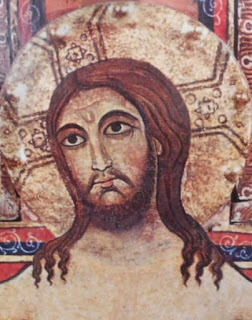 The Catholic Church is His Church, and the shape of her life is His glorified life radiating through history, His Lordship of every time and place. He uses the Church's ministers and members, even with all their enormous faults, to go forth into the world and give Himself.
The Catholic Church is His Church, and the shape of her life is His glorified life radiating through history, His Lordship of every time and place. He uses the Church's ministers and members, even with all their enormous faults, to go forth into the world and give Himself.He also works through the Church in the lives of those Christians not fully in communion with her, because of the measure of unity that really does exist.
And He works through the Church even among the multitudes of non-Christians, through the Church's dialogue and witness, her presence and prayer, and also—mysteriously—through the way human existence and human destiny are in themselves consecrated in Christ through the Church.
The Catholic Church is for every human being because Jesus loves every human being, and seeks the salvation and eternal fulfillment of every single human person with all the ardor of His Sacred Heart. What matters first and fundamentally is that He is at work in and through His Church.
I entrust everyone to His infinite mercy.
Jesus living in His Church is not my "belief system," not just my particular “philosophy of life” or my “support community”—something that “works for me” but might not necessarily “work for you.” He is for me, because I am a human being. That means He is for you.
I am sure of this.
But how? Who do I think I am anyway? What makes me so sure that my ideas about the meaning of life are true for everyone? That is just the point: these are not “my ideas”—this is a relationship. He is here, in my life, in a relationship with me. In fact, He started it—not me.
There is no way I could give myself this certainty, not even with all the philosophy of all the ages. What could possibly sustain this certainty in a blockhead like me?
I am amazed at myself, at the fact that I am so sure about this. I haven’t seen any miracles. I haven’t had any visions. And it is definitely not because I have a “deep spirituality”—I am a spiritual wimp.
What make me certain? It is Jesus Himself—not just some vague ideals about “goodness” or “the importance of Christian ethics” or “my understanding about the meaning of suffering.”
It is Jesus, the objective, actual, true Son of God, the living man who is with us now.
That is why I am a Catholic Christian. Because He is here. I need to be with Him. We all need to be with Him.
Published on June 08, 2015 13:14
June 6, 2015
June 6, Feast of Saint Norbert. Who is He?
Today is the Feast of Saint Norbert (1080-1134), who laid important foundations for the renewal of Christian life that blossomed in the High Middle Ages. In her Collect in today's liturgy, the Church prays:
O God, who made the Bishop Saint Norbert
a servant of your Church
outstanding in his prayer and pastoral zeal,
grant, we ask, that by the help of his intercession,
the flock of the faithful may always find shepherdsafter your own heart
and be fed in the pastures of salvation.
Through our Lord Jesus Christ, your Son, who lives and reigns with you in the unity of the Holy Spirit, one God, for ever and ever.
In case you missed the story of Saint Norbert's conversion and vocation (Magnificat, April 2015) or simply would like to read it again, I shall reproduce it here for your convenience. I encourage you, if you have not already done so, to subscribe to this wonderful magazine (click HERE).
One reason why you should read the magazine is that the quality is much better than these very quick, photographed reproductions that I make, that often look like old microfilm (who remembers that?). I apologize, but the text below is at least clear and legible (old geezers like me might want to put on their glasses!).
Saint Norbert, pray for us!

O God, who made the Bishop Saint Norbert
a servant of your Church
outstanding in his prayer and pastoral zeal,
grant, we ask, that by the help of his intercession,
the flock of the faithful may always find shepherdsafter your own heart
and be fed in the pastures of salvation.
Through our Lord Jesus Christ, your Son, who lives and reigns with you in the unity of the Holy Spirit, one God, for ever and ever.
In case you missed the story of Saint Norbert's conversion and vocation (Magnificat, April 2015) or simply would like to read it again, I shall reproduce it here for your convenience. I encourage you, if you have not already done so, to subscribe to this wonderful magazine (click HERE).
One reason why you should read the magazine is that the quality is much better than these very quick, photographed reproductions that I make, that often look like old microfilm (who remembers that?). I apologize, but the text below is at least clear and legible (old geezers like me might want to put on their glasses!).
Saint Norbert, pray for us!

Published on June 06, 2015 09:58
June 5, 2015
Where Do We Place Our Hope?
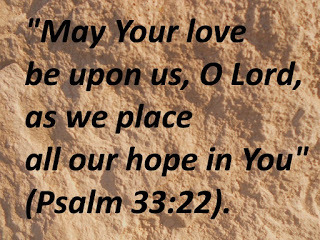 The people of Israel knew to place their hope in God. There has never been a human being whom God has not prompted again and again to the relationship of hope. In the vast ages before the coming of Christ, the prompting was for a promise destined to be fulfilled, and the human heart itself--drawn by God's mercy and love--spoke in hidden languages about a longing and a purpose that it did not understand.
The people of Israel knew to place their hope in God. There has never been a human being whom God has not prompted again and again to the relationship of hope. In the vast ages before the coming of Christ, the prompting was for a promise destined to be fulfilled, and the human heart itself--drawn by God's mercy and love--spoke in hidden languages about a longing and a purpose that it did not understand.Even today, so many hearts--surrounded by walls of ignorance, presuppositions, and misunderstanding--are still drawn by God to speak the secret language of hope.
The plea of the Psalm indicates the object of this hope for all time, and for every person who is seeking in the midst of impossible hindrances, who aspires to a destiny that calls him or her, but who does not know the way:
"May your love be upon us, O Lord...."
Jesus Christ is the love of the Lord who has come "upon us," for each one of us, for each person in the inner depths of his or her originality, and for the whole human race, called to gather together as God's people. Those of us who know His Name pray all the more vividly, "May your love be upon us, O Lord, as we place all our hope in you."
Come Lord Jesus, we trust in You. Lead each step of the way, and overcome whatever hinders us. Make us witnesses to Your mercy, so that those who search for a place to put their hope might discover that they have been made for You.
Published on June 05, 2015 20:01
June 3, 2015
Seeds of the Church: Remembering the Martyrs of Uganda
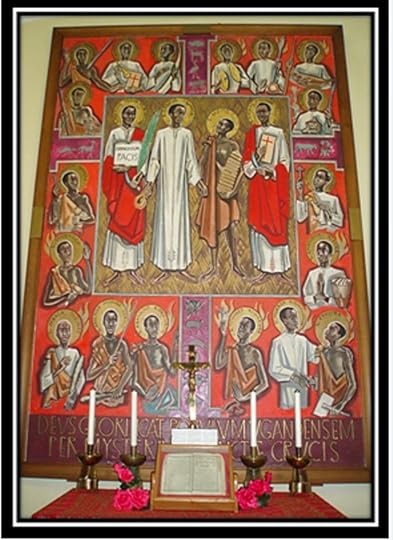 Icon of the martyrs at the Shrine
In honor of the Uganda martyrs, I present here my post from last year and the links embedded herein. Holy Saints and Martyrs of Uganda, pray for us
.
Icon of the martyrs at the Shrine
In honor of the Uganda martyrs, I present here my post from last year and the links embedded herein. Holy Saints and Martyrs of Uganda, pray for us
.In graduate school I first became friends with students and priests from Uganda who greatly enriched my appreciation for the Uganda Martyrs. 22 Catholic martyrs of the late 19th century were canonized by Pope Paul VI in 1964. They are commemorated on June 3, the anniversary of the burning-to-death in 1886 of St. Charles Lwanga and eleven fellow Christian servants of the Ugandan Kabaka (King). There are ten other Catholic martyrs during this period who are also grouped into today's feast. Each one has an awesome story that was carefully recorded from eyewitness testimony for the beatification proceedings in the early twentieth century.
It is unfortunate that the stories and even the names of their Anglican companions in this dramatic ecumenical gesture of common witness have been lost, as the Anglicans didn't have the kind of rigorous investigative process for beatification or the emphasis on individual saints that is so prominent in the Catholic tradition. The Catholic martyrs, after the collection of the testimony of numerous still-living witnesses, were beatified in 1920. Last October 18 marked the 50th anniversary of their canonization, and the Catholic Church in Uganda dedicated the whole year of 2014 to a renewal of faith for millions of people who stand today as the heritage of the martyrs.
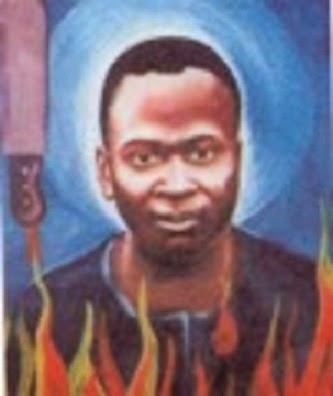 St. Joseph MukasaAmong the martyrs who were not in St. Charles Lwanga's group are several outstanding adults, including St. Mattias Mulumba and St. Andrew Kaggwa, both catechists and married men with families. Another of the martyrs who particularly inspires me is St. Joseph Mukasa Balikuddembe, who was the personal attendant of King Muteesa and his son King Mwanga II, and head of the royal household. He was able to obtain religious freedom for Christians (for a limited time prior to 1885), and his teaching and example led to a large number of conversions and strengthened the faith of many of the new Christians. But he also fearlessly rebuked King Mwanga for his superstitious and immoral life and in particular for the execution of a Protestant missionary bishop. The King saw this as a challenge to his absolute royal authority, and he turned against Christianity. Joseph Mukasa was brutally tortured and executed for teaching the Christian faith and for his defense of Christians on November 15, 1885. He is a patron saint of politicians.
St. Joseph MukasaAmong the martyrs who were not in St. Charles Lwanga's group are several outstanding adults, including St. Mattias Mulumba and St. Andrew Kaggwa, both catechists and married men with families. Another of the martyrs who particularly inspires me is St. Joseph Mukasa Balikuddembe, who was the personal attendant of King Muteesa and his son King Mwanga II, and head of the royal household. He was able to obtain religious freedom for Christians (for a limited time prior to 1885), and his teaching and example led to a large number of conversions and strengthened the faith of many of the new Christians. But he also fearlessly rebuked King Mwanga for his superstitious and immoral life and in particular for the execution of a Protestant missionary bishop. The King saw this as a challenge to his absolute royal authority, and he turned against Christianity. Joseph Mukasa was brutally tortured and executed for teaching the Christian faith and for his defense of Christians on November 15, 1885. He is a patron saint of politicians.This led to further executions of prominent Christians, and finally to the young men and boys who served the King. In addition to being pathologically obsessed with his own power, Mwanga was also a serial sex predator and pedophile. The Christians, led by Charles Lwanga, resisted the King's abuse and protected others from it. King Mwanga demanded that they renounce this faith that opposed his desire to turn his servants into a caged harem of boys subjected to his every lustful whim and brutal fantasy. In fidelity to God and His truth, they refused the King and were subjected instead to death for the glory of their newly found Lord, Jesus.
 Bishops and pilgrims 2014 (from The Observer,
Bishops and pilgrims 2014 (from The Observer,Online news and opinion journal from Uganda)Today all these martyrs are the heroes of the Catholic people of East Africa. You can read each of their stories here on the website of the Uganda Martyrs Shrine, which is located at Namugongo, the sight of the torture and death of St. Charles Lwanga, 11 Catholic servants of the King (nearly all of them under 20 years of age), and a number of Anglicans as well. The Shrine is a place of pilgrimage all year round but especially on June 3, which is an official holiday in Uganda and is known as "Martyrs Day." Last year a million pilgrims gathered at the Shrine from the region and the whole world to celebrate Martyrs Day.
 The Shrine of the Uganda MartyrsThe story of the Catholic martyrs of Namugongo, including their final "death march," was preserved in great detail by Denis Kamyuka, one of the Catholic royal pages who was condemned to death with the others and taken all the way to the place where they were burned, only to be pardoned at the last moment because of the pleas of relatives who were associated with the King's family. It is because of his detailed testimony at the beatification process over thirty years later that we have a vivid narrative of their heroic sufferings and deaths.
The Shrine of the Uganda MartyrsThe story of the Catholic martyrs of Namugongo, including their final "death march," was preserved in great detail by Denis Kamyuka, one of the Catholic royal pages who was condemned to death with the others and taken all the way to the place where they were burned, only to be pardoned at the last moment because of the pleas of relatives who were associated with the King's family. It is because of his detailed testimony at the beatification process over thirty years later that we have a vivid narrative of their heroic sufferings and deaths.Denis Kamyuka was present at the beatification of his companions and friends in 1920, and it is said that he wept for not being among them. But he was spared so that the whole world might know the story of the witness that was given on that day. You can read the story here . There is a litany of the Uganda Martyrs that is published by the Shrine; a profound and powerful prayer for the multitude of pilgrims who come from all over East Africa (and the world) to honor and seek help from these saints who are their forebearers in the faith. Click here for the litany and the invocations.
Published on June 03, 2015 20:57
June 2, 2015
John Paul Officially Grows Up
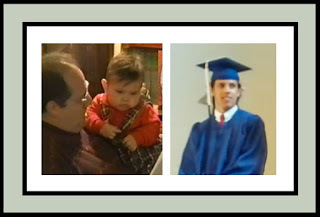 This is a year of milestones for John Paul Janaro. In fact, it's been a week of milestones!
This is a year of milestones for John Paul Janaro. In fact, it's been a week of milestones!This past Friday he graduated from Chelsea Academy. At the beginning of this week he turned eighteen years old. According to American law, he is now an adult.
I think I am beginning to believe that kids really do grow up.
I've done enough "baby retrospectives" on John Paul. But on the occasion of his high school graduation, I could not help remembering the first "graduation ceremony" in his life. It was just a family affair, with Eileen and me and the kids and Uncle Walter and "Papa and Grandma." This is a blog. I have to do a flashback of some kind.

So, first of all, here is a nice picture of John Paul receiving his Salutatorian award from the headmaster of Chelsea in 2015:

And here are some pictures from his kindergarten graduation in the summer of 2003. The "Saint Benedict Academy" was a fancy name for the Janaro family homeschool. With his mother as teacher, of course, you can be assured that his kindergarten education marked a worthy accomplishment:
 John Paul demonstrates reading proficiency in this presentation to the family assembly.
John Paul demonstrates reading proficiency in this presentation to the family assembly.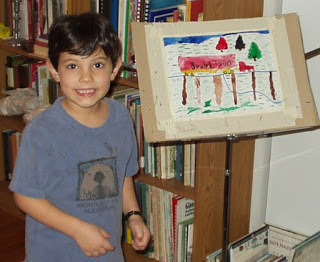 John Paul presents his "kindergarten project," a graphic that has something to do with trucks and bridges, I think...
John Paul presents his "kindergarten project," a graphic that has something to do with trucks and bridges, I think... John Paul is awarded his kindergarten diploma in 2003, with all the rights and privileges pertaining to it!
John Paul is awarded his kindergarten diploma in 2003, with all the rights and privileges pertaining to it! Okay I'm sure Papa and Grandma remember this little boy very well. So do we! He's gotten bigger, but he's brought all that was best in that boy with him.
When I began this blog, John Paul was still thirteen. In the past four and a half years he has grown into a young man in so many ways. As parents we can only be amazed and "proud" (in the most positive sense of the term).
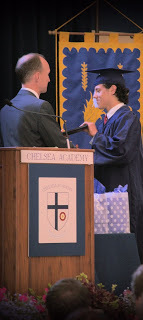 John Paul receives his diploma.John Paul is still young, of course. But he has made his first achievements in the "adult world." A high school graduation is significant enough, but Chelsea Academy is a special challenge. The range of the Chelsea educational experience reminds me of a gymnasium or a liceo classico in Europe combined with the athletics and extracurricular activities of an American prep school.
John Paul receives his diploma.John Paul is still young, of course. But he has made his first achievements in the "adult world." A high school graduation is significant enough, but Chelsea Academy is a special challenge. The range of the Chelsea educational experience reminds me of a gymnasium or a liceo classico in Europe combined with the athletics and extracurricular activities of an American prep school.But there is nothing snobbish about Chelsea. Rather, my kids are being challenged to work hard, play hard, and embrace responsibility in a spirit of friendship. It strikes me as the healthy and constructive path to open up and engage the energy of adolescence. We are so grateful to this beautiful school, to this great gift of God in the life of our family.
John Paul more than rose to the challenge. He graduated with a nearly perfect GPA, lettered in basketball, tennis, math club, drama, and finished second in his class.
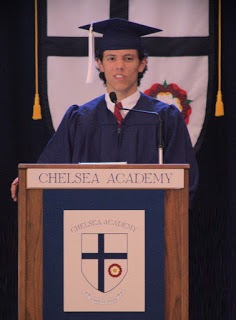 John Paul gives Salutatorian address.It was an amazing thing for me, thirty years after giving the Valedictorian address at my own college graduation, to sit in the second row and listen to my son give a beautiful and articulate Salutatorian speech at his own high school commencement.
John Paul gives Salutatorian address.It was an amazing thing for me, thirty years after giving the Valedictorian address at my own college graduation, to sit in the second row and listen to my son give a beautiful and articulate Salutatorian speech at his own high school commencement.The greatest blessing, however, has been to watch John Paul mature in his own faith, his own awareness of the concreteness of his personal relationship to Christ.
He has learned from family life and at school, but in a irreplaceable way he and his classmates have learned something from the presence of Jesus with them, from their own experience of being-together for a reason that encompasses and gives value to everything.
They have had a taste of the Mystery drawn close to their own lives and hopes. They have encountered Jesus in a new and compelling fashion. Especially in their senior year, they struggled with problems and challenges that enabled them to see the presence of Jesus building them up together, and including the larger circle of former classmates who had left for other schools but who continued to grow together as friends.
John Paul says that he has made friends for life. Indeed, he has made friends for eternity.
 Some of the Class of 2015, after commencement. Visit Chelsea's website HERE.
Some of the Class of 2015, after commencement. Visit Chelsea's website HERE.This most important of all lessons has just begun for my son. But with it he is deepening his own identity as a person. He is growing up and maturing in his own freedom, and I don't really feel like we're "losing a child" but rather gaining a deeper bond with a person who will continue to be "with us," wherever his journey may take him.
Published on June 02, 2015 17:33
June 1, 2015
God's Fatherly Gaze Will Give Us Strength

"Do not be afraid to ask,
even to challenge the Lord, 'Why?'Maybe an explanation won’t come,but His Fatherly gaze
will give us the strength to go forward.... The most important thing is this gaze.And your strength is there:the loving gaze of the Father."
~Pope Francis
Published on June 01, 2015 13:30



